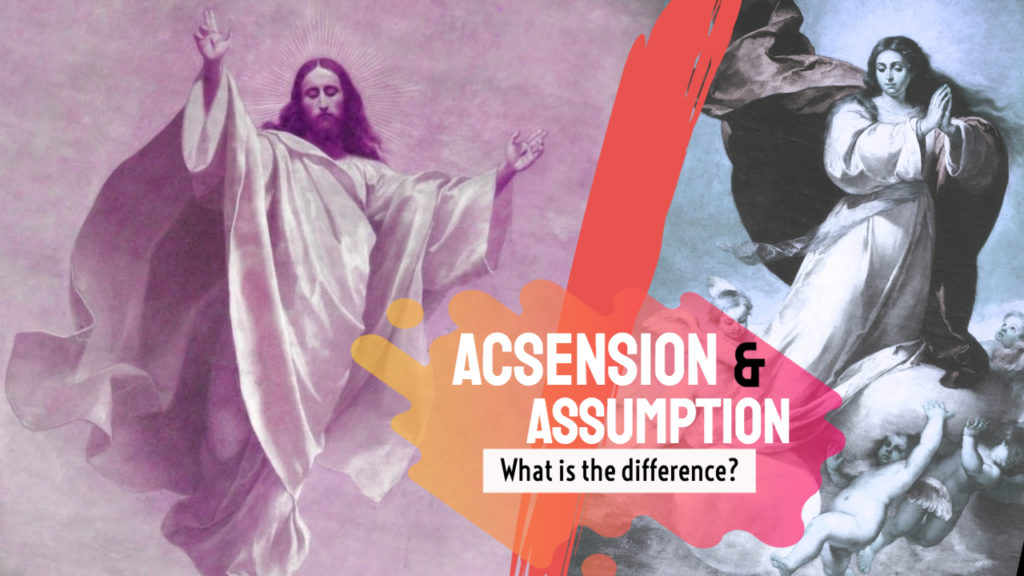Reflections:
Catholics celebrated the Ascension of the Lord this year on Thursday, May 20 which is the 40th day of Easter. In some places it was being transferred to the following Sunday which was May 24, for practical reasons. It was in this context of the celebration of the Ascension, someone asked me the question, what is the difference between the “Ascension” and the “Assumption”? This question prompted me to write this blog post.
Ascension is the feast that Catholics celebrate on the 40th day of Easter. The number 40 is very biblical and there are several references about the number 40 in the Bible. Generally, it refers to the life span of a person (a Generation). Moses was on the Mount of Sinai for 40 days before he received the Ten Commandments of God; he was forty when God chose him to be the leader of his people; he was in the desert with God’s people for forty years. Prophet Jonah preached to the people of Nineveh for forty days. Prophet Elijah walked forty days without food and water. The great flood was for forty days. Jesus fasted forty days before he began his public ministry. Therefore, forty is very important in the Bible due to different reasons.
“It was in this context of the celebration of the Ascension, someone asked me the question, what is the difference between the “Ascension” and the “Assumption”? This question prompted me to write this blog post. “
The Ascension refers to our Lord’s bodily entrance into Heaven on the fortieth day of Easter. The date of the Ascension keeps changing as the dates of Easter change! It is described in Acts1: 1-14, and is mentioned briefly in Mark 16: 19-20 and in Luke 24: 50-53. Although the Scripture uses the words “He was lifted,” we use the word “ascension,” which suggests something done under one’s power; for Jesus Christ is God and is all-powerful. The Feast of the Ascension is not the conclusion but the culmination of the ministry of Jesus.
The feast of the Ascension leads to the Feast of Pentecost which is celebrated on the 50th day of Easter. The word Pentecost in Greek (pentecostes) means the 50th. Pentecost in the Old Testament was originally a post-harvest thanksgiving feast celebrated on the 50th day of the Feast of the Passover, to which, the Jews added the remembrance of God’s Covenants with Noah after the Deluge and with Moses at Mount Sinai. In the New Testament, Pentecost is the descending of the Holy Spirit on the Apostles and Blessed Virgin Mary which made them courageous people to preach Christ to the world. Pentecost is the birthday of Holy Mother Church. The Feast of Pentecost officially concludes the Season of Easter and begins Ordinary Time of the Liturgical Calendar.

The Assumption is celebrated always on August 15, every year. It refers to the taking up, body and soul, of the Blessed Virgin Mary at the end of her earthly life. In this case, the word indicates that she was taken to Heaven by a power apart from herself. It is one of the four dogmas on Blessed Mother. The Assumption was made a dogma and the feast was constituted on November 1, 1950 AD by Pope Pius XII who declared: “We pronounce, define, and declare it to be a divinely revealed dogma: that the Immaculate Mother of God, the ever-Virgin Mary, having completed the course of her earthly life, was assumed body and soul into heavenly glory.”1
The Assumption is not recorded in Sacred Scripture, but several writings are inferring to the Assumption of Blessed Mother; sometimes called “Dormition,” or “falling asleep” of our Lady. This doctrine has been acknowledged by the faithful both in the east and in the west since the earliest times. It has been the subject for many of the Fathers and Doctors of the Church; and there are numerous churches dedicated to her honor.
Lovingly,
Fr Tomy Puliyan, MSFS
“Holiness and Happiness through Wellness and Wholeness”


Excellent detail and informative. Thank you. As always, you keep me reading.
Thanks Tom for the clear distinction made between Ascension and Assumption.